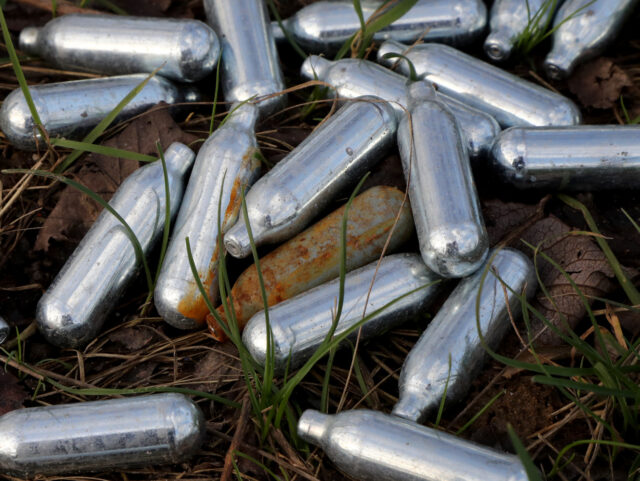The UK government has announced a new ban on laughing gas, labelled “hippy crack”, yet critics of UK law enforcement note lax enforcement of drug laws already on the books has meant de facto decriminalisation for some substances.
Britain’s Tory Party government have announced a ban on Nitrous Oxide — also known as “laughing gas” and “hippy crack” — as part of its efforts to “crack down” on antisocial behaviour in the country.
However, it is unclear how effective such a ban will be considering the regular failings of the country’s police to enforce the laws that already exist. Critics note, for instance, the degree to which cannabis possession has been effectively decriminalised by a systemic failure to enforce the law and using ‘cannabis warnings’ instead.
During an interview with broadcaster Sky News, so-called “Levelling Up” secretary Michael Gove said that the ban would help curb “antisocial behaviour” in the country, adding that it was “vital” for the government to restrict the usage of laughing gas.
“I think anyone who has the opportunity to walk through our parks in our major cities will have seen these little silver canisters, which are examples of people not only spoiling public spaces but taking a drug which can have a psychological and neurological effect and one that contributes to antisocial behaviour overall,” he said during the interview.
“We can’t have a situation, we mustn’t have a situation where our drugs, our public spaces become drug taking arenas and that is why we need to do crackdown on new manifestations of drug taking,” Gove added. “These laughing gas canisters are an increasing scourge, and one that has been reported to me as a constituency MP.”
The laughing gas ban is part of the UK government’s larger “Action Plan” to cut down on antisocial behaviour in England and Wales, with authorities vowing they will take a “zero-tolerance approach” to the likes of graffiti and public drug use.
However, such a pledge appears to be hard to believe considering the past actions of police in both UK nations, which have recently been extremely lenient on certain drug-related crimes, opting to focus on other policing duties instead.
Law enforcement has even been accused of implementing a de-facto legalisation of cannabis without government permission over the last number of years, with statistics released last year showing prosecutions for possession of the drug falling to just 16 per cent in 2022.
“Our priorities are about keeping society safe and we simply do not have the resources to go after everybody who is found in possession of cannabis,” one police insider said regarding the unofficial policy, which was described by one expert as “decriminalisation by stealth”.
It is unclear whether or not laughing gas — if made illegal — would be treated any differently, with some groups arguing that a ban on the substance would be “completely disproportionate”.
“It won’t stop young people using it, banning any substance just drives it into criminal hands and the inherent risks associated with the black market come into play, I don’t think it will stop people doing it,” David Badcock, from the Drug Science Scientific Committee NGO, said regarding the proposed ban.

COMMENTS
Please let us know if you're having issues with commenting.